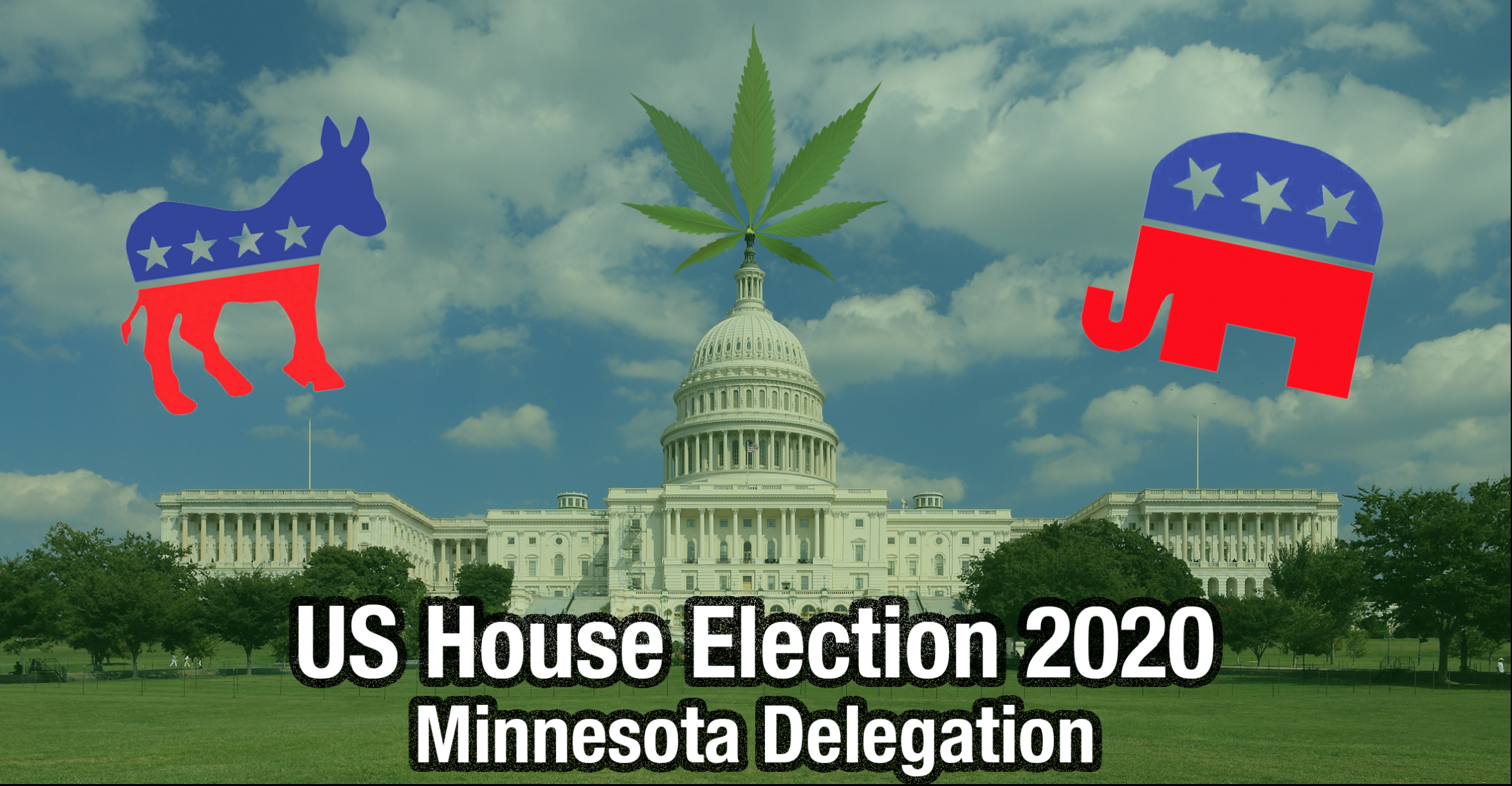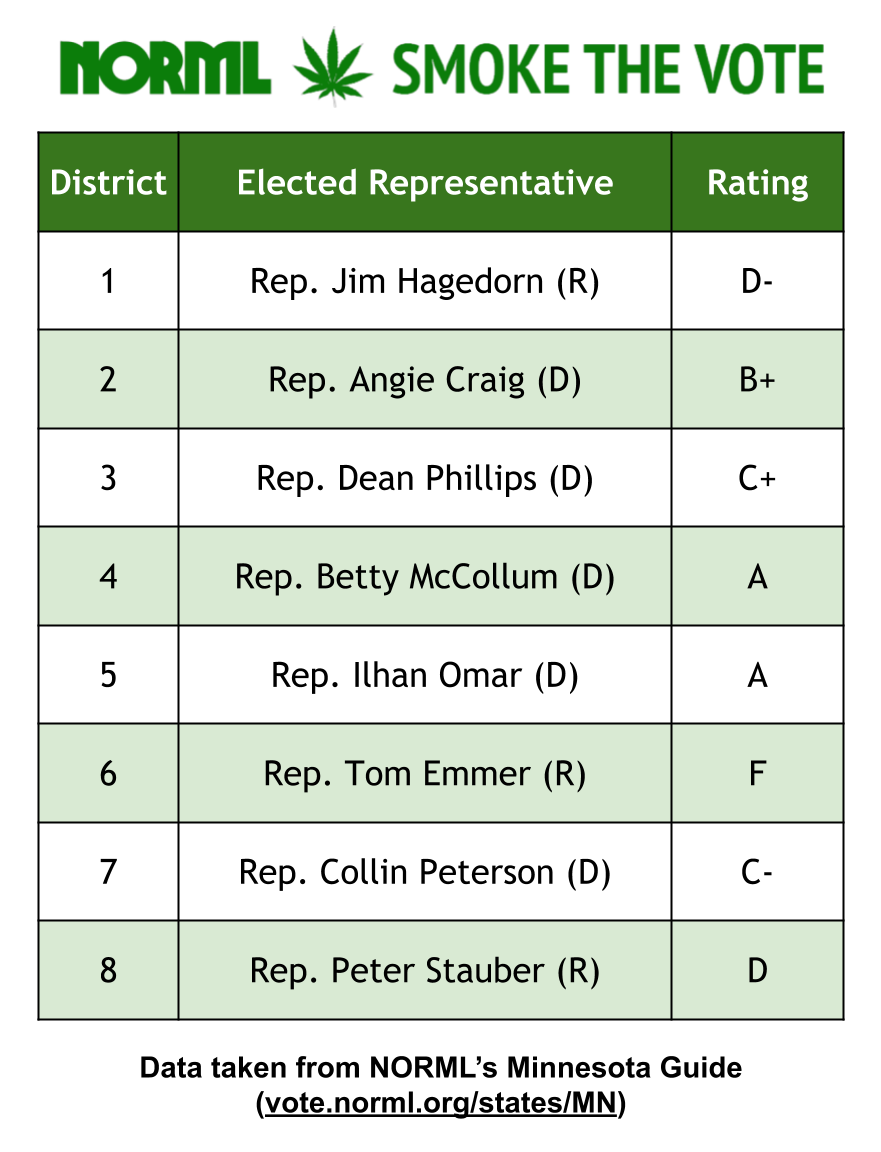

On Sunday, the Minnesota DFL Party announced its nominated candidates for the United States House of Representatives. This means that two of the four major party’s in Minnesota now have their delegate-endorsed candidates for November locked in for the US House. While we can assume that candidates from Legal Marijuana Now and Grassroots-Legalize Cannabis support legalization, where do candidates from the other two parties stand?
From a party standpoint, both the DFL and the GOP include marijuana-specific policies in platform documents. The DFL’s action agenda includes “Support the legalization, regulation, and taxation of marijuana in a manner similar to that of tobacco or alcohol” as a party objective. This directly counters the GOP’s standing platform which states “We believe that public safety is better served if we do not legalize recreational marijuana.”
The 1st Congressional District DFL once again endorsed Dan Feehan to run in a rematch against incumbent Republican Representative Jim Hagedorn. Throughout the 2018 election and so far this year, Feehan has not yet made his views on cannabis known (and his campaign has not yet responded to a request for comment). Rep. Hagedorn does not support legalization or criminal expungement and does not support allowing states to decide their own cannabis policies. In credit to Rep. Hagedorn, however, he did vote in favor of the SAFE Banking Act, which passed the House but has yet to pass the Republican-controlled Senate.
The congresswoman from the 2nd congressional district, Representative Angie Craig, said in 2018 that “I support the legalization of marijuana for recreational purposes for people 21 and over. This should be taxed and regulated.” Since then, she has voted in favor of preventing federal intervention into legal adult-use and medical states and voted for the SAFE Banking Act. Former Marine Tyler Kistner is challenging Craig, but has not yet made his views known on cannabis reform.
Representative Dean Phillips, the freshman congressman from the 3rd Congressional District, is a supporter of rescheduling cannabis and leaving the legalization and regulation to the states. A supporter of the SAFE Banking Act and preventing federal interference in legal markets, Rep. Phillips has not yet come out in support of federal legalization as others in the Minnesota congressional delegation have. Rep. Phillips is being challenged by medical tech executive Kendall Qualls, who has not yet publicly discussed cannabis reform either favorable or negatively.
Representative Betty McCollum was once again endorsed by the 3rd Congressional District DFL. Representative McCollum has cosponsored a number of cannabis reform bills (STATES Act, SAFE Banking Act, Ending Federal Marijuana Prohibition Act of 2019, among others) and has voted in favor of preventing Justice Department intervention in legal adult-use and medical cannabis states. NORML has given Rep. McCollum an ‘A’ for her support for adult-use and medical cannabis, but McCollum has not yet come out in support of legalization at a national level. Representative McCollum is facing Republican-endorsed attorney Sia Lo who has represented clients for cannabis crimes but has not yet made his own views on the subject known.
Representing the 5th Congressional District, Representative Ilhan Omar has been a vocal supporter of the federal legalization of cannabis. Her campaign website calls to “Legalize recreational cannabis nationwide, expunge the records and seek amnesty for those incarcerated for cannabis-related offenses.” While in Congress, Rep. Omar’s votes have reflected this support, co-sponsoring the Marijuana Justice Act of 2019 while also voting in favor of the SAFE Banking Act and protecting legal and regulated cannabis markets from Justice Department interference. Republican-backed Lacy Johnson is running against Omar, who has not spoken on cannabis but does say on his website that he supports “States’ rights”.
6th Congressional District candidate Tawnja Zahradka was asked at a DFL debate back in February if she supported legalizing marijuana. “I think if we can go out and buy booze we should be able to go out and buy marijuana,” Ms. Zahradka said, “It helps people.” The sixth congressional district is currently represented by Republican Representative Tom Emmer, who has a mixed history with federal cannabis reform.
Representative Collin Peterson was once again endorsed by the DFL to represent the 7th Congressional District and, similar to Rep. Emmer, he has a mixed history with cannabis reform. Rep. Peterson breaks from the rest of the DFL Congressional Delegation in not supporting the rights of states to legalize adult-use cannabis. Peterson does support a state’s rights to set medical cannabis policy, but voted against allowing VA doctors to recommend medical cannabis for veterans in states where it is legal (such as Minnesota). Facing Rep. Peterson is Former Lt. Gov. Michelle Fischbach. While Fischbach has not publicly declared if she would support cannabis reform while in Congress, she refused to vote on the bipartisan medical cannabis bill while in the Minnesota Senate in 2014.
The DFL-endorsed candidate for the 8th Congressional District, Quinn Nystrom, has not yet made her views known on cannabis law reform and her campaign has not yet responded to a request for comment. Nystrom’s Republican-endorsed opponent, incumbent Representative Pete Stauber, is not a supporter of cannabis legalization. As a former police officer, Rep. Stauber believes that all drugs, including cannabis, are bad. “My job as a police officer was to protect my citizens and get all drugs off our streets and out of the hands of our youngest and brightest, which includes marijuana,” Stauber said back in 2018.
The two other major parties in Minnesota (Legal Marijuana Now and Grassroots-Legalize Cannabis) have not yet endorsed candidates for the eight House of Representatives seats.
Do you know the views of one of the candidates listed above on cannabis reform? Let us know at tanner@mncannabiscollege.com, or find us on social media.


